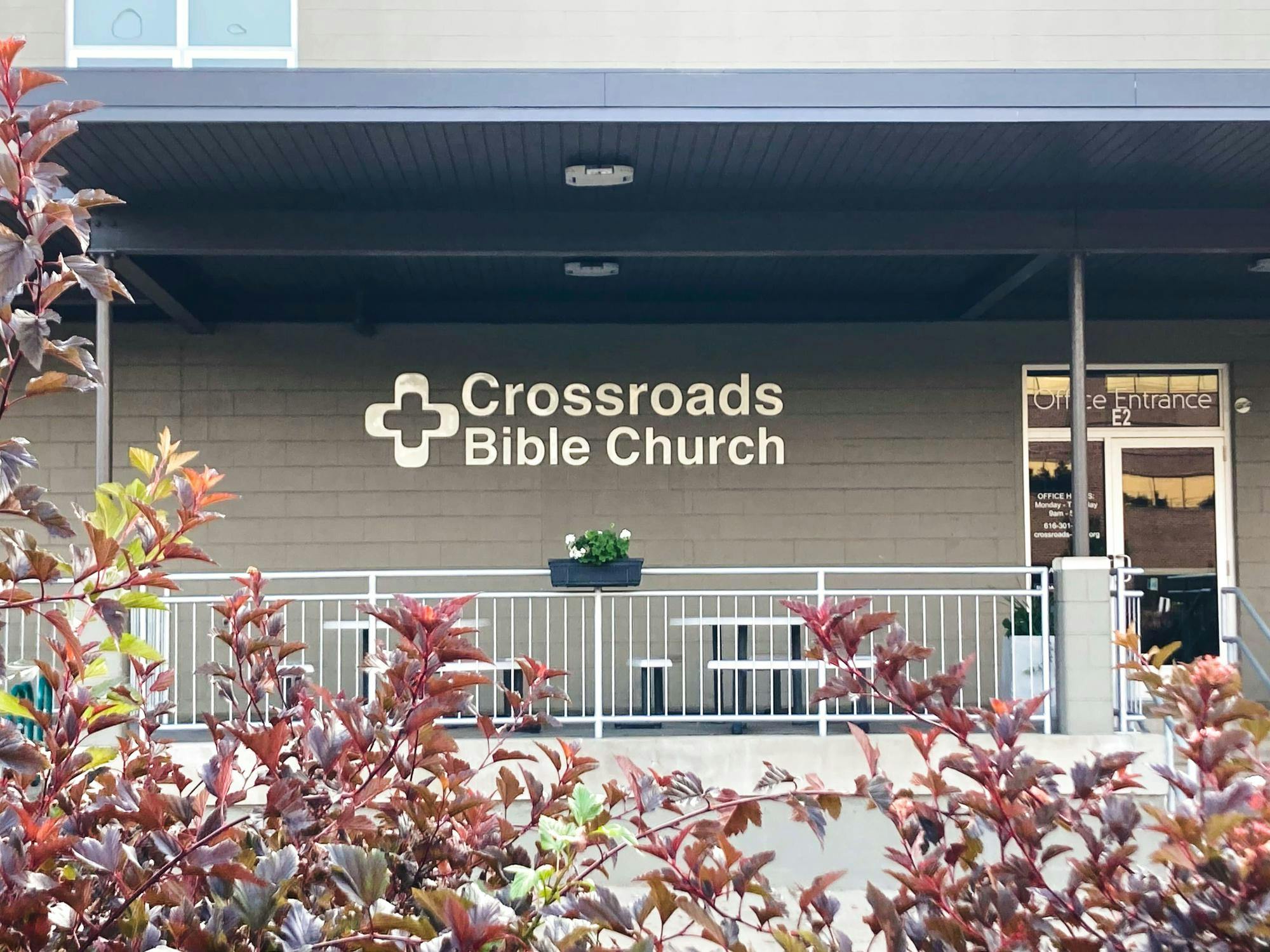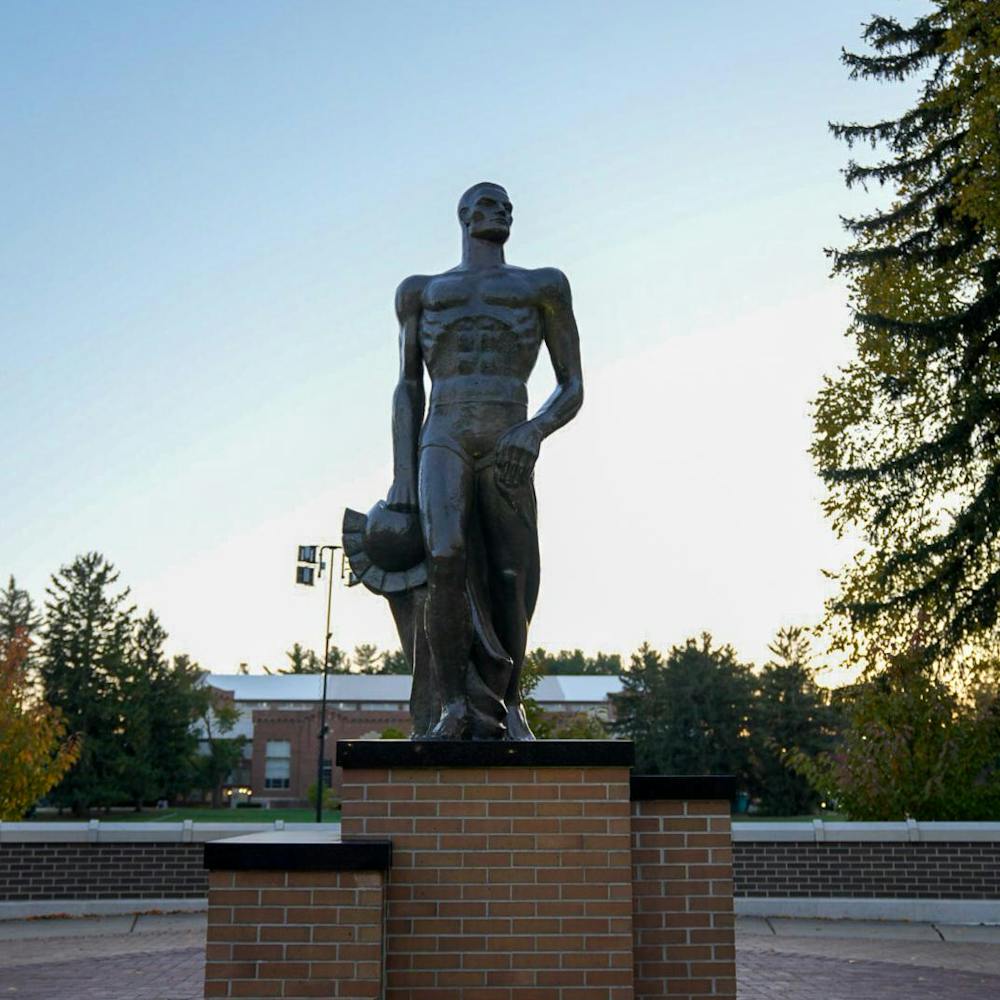As zucchini bread was dished out on paper plates and oatmeal scooped into plastic cups, Isabella Purosky walked through the lobby of Crossroads Bible Church, greeting people gathered around folding tables as she went. She asked one woman how she’s been.
“Good, now that I don’t have a man in my life,” she replied.
Purosky laughed and walked to a table with three sign-up sheets for services being offered that day: showers, haircuts and foot washing. Names were already starting to pile up.
Across the building, tucked into a folder and sitting on a make-shift desk outside what’s typically used as the church’s prayer room, was a similar sheet. By 10 a.m., it would start to fill up with the familiar names of those hoping to be seen by Purosky and her colleagues. Soon, a line would form outside the prayer room of people looking to speak to someone about their ailments.
A student at MSU’s college of human medicine (CHM), Purosky is part of a team working to provide free, high-quality healthcare to those who are experiencing homelessness in Kent County. Composed of around 25 physicians and over 300 student volunteers, Grand Rapids Street Medicine (GRSM) partners with local outreach programs to set up pop-up clinics throughout Grand Rapids. Crossroads Bible Church is one of three venues.
Before becoming the clinic coordinator for Crossroads, Purosky took two months to get to know the people who come to the church every Tuesday at 10 a.m. to make use of the various resources they offer. Part of making those connections involved washing feet, an intimate act she said helped get people to open up to her. Footcare is especially important for people who can only take their shoes off when they know someone won’t steal them.
“If you establish that connection, they have more ability to trust you,” Purosky said. “Not ‘you’ as a medical professional, but ‘you’ as a person.”
The organization’s permanent office, located in Mel Trotter Ministries, is complete with patient rooms and lab testing. Under the supervision of a licensed physician, medical student volunteers are able to refill prescriptions and refer patients to other resources.
“It looks like what you would see when you go to the doctor,” GRSM co-president Victoria Moaddel, who will graduate in 2024 from the College of Human Medicine, said. When Moaddel started volunteering for GRSM in 2018, the organization had only one clinic and a couple workers. Now she works alongside dozens of her peers to serve around 60 patients a month.
The students who volunteer at GRSM get the chance to practice what they’ve already been taught in school. But the clinics also help students hone a more unique skill: empathy.
“Our hidden agenda in street medicine is that we're trying to train the next generation of compassionate physicians who are familiar with the needs of this population and are ready to jump into the community and make a difference,” GRSM co-president and CHM student Christa Schafer-Nutile said.
When her work gets rough, Schafer-Nutile reminds herself of a man who came into a clinic once for a chronic issue. As she and her colleagues went about the examination, he began to open up about his life on the streets. She wasn’t surprised; it’s something many patients do at the clinics.
“I feel like ten percent of what we do is provide care, and ninety percent of what we do is listen,” Schafer-Nutile said. “[We] give people an opportunity to talk about their story, to know that they are heard and seen and really cared for.”
As they wrapped up, he shared what Schafer-Nutile feels is a good summary of why her work is important.
“Every time I step into an emergency room,” the man told her, “I am already seen as a drug seeker. I am already seen as the enemy.”
He was grateful that at this clinic, he felt different.
A key function of GRSM is bridging the gaps in healthcare. Moaddel said populations that don’t receive the treatment others do often end up feeling unworthy of it. GRSM hopes to challenge that with a commitment to “the needs of the medically underserved.”
The organization also tries to be sensitive to the place it holds in its community. Organizers make sure each new clinic they set up is welcomed and needed by the people they hope to serve, and isn’t seen as an intrusion.
“You can't just walk into someone else’s community and think that they need you,” Moaddel said. “You have to build trust, especially in patients who have a history of trauma.”
The uniqueness of the organization’s disposition and purpose grows as the Grand Rapids City Commission considers a proposal that seeks to crack down on homelessness by targeting loitering, storing one's belongings in public areas and panhandling.
While the proposed amendments to Grand Rapids’ “nuisance code" don’t seek to criminalize homelessness, many members of the public worry the changes won’t address its larger causes, like lack of affordable housing, substance abuse and access to mental health resources.
A city commission meeting was held July 11, allowing public comment on the proposal.
“You don't need the extensive, complicated puppetry being demonstrated by this nuisance amendment,” one person told the board. “Enforce the laws you have, and instead put your time, energy and resources into real solutions to the crisis.”
Grand Rapids Mayor Rosalynn Bliss told a local news station that the ordinances aren’t supposed to be the final solution to homelessness. But the work of GRSM won’t be finished until the city starts putting such solutions into effect.
“Those folks experiencing homelessness are still going to be there unless you systemically change things,” Moaddel said.
Students interested in getting involved with Grand Rapids Street Medicine can follow their Instagram, @grandrapids_streetmedicine, or visit their booth at Sparticipation.







